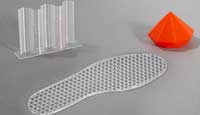
The Dow Chemical Corporation (Dow) introduced two new liquid silicone rubbers (LSRs) in October 2019, which the company claims will add significantly to liquid silicone technology. Exhibited in Ohio, US, the new LSRs – Silastic LTC 9400 and Silastic 3D 3335 –offer unique advantages to Dow’s customers, according to Gifford Shearer, Market Manager at Dow Consumer Solutions, and John McKeen, Dow’s TS&D Director.
The first of the two LSRs, the Silastic LTC 9400, which cures rapidly at a lower temperature (100°C instead of 150-160°C), has flexible applications in various industries due to the combinations of silicones with plastics, such as polypropylene and polycarbonates, and a fast temperature activation across a wide processing temperature range.
The easy-to-use LSR materials are supplied in two parts and mixed in a 1:1 ratio before moulding– they are especially suited to high-volume injection moulding applications; the low-temperature curing allows over moulding the LSR elastomers into low-melting-point plastics or other thermally sensitive components, thereby increasing design freedom, something which couldn’t be done before because of high temperatures.
“In addition, with faster cure times at standard/elevated temperatures, cycle time savings can be realised for standard, moulded components,” Dow said.
Other key characteristics of LTC 9400 LSRs include a self-lubricating, oil-bleeding option for easy component assembly and reliable sealing; and improved rheology for higher injection speeds.
On the other hand, the Silastic 3D 3335, which allows processing advantages of liquid additive manufacturing 3D printing, offers properties comparable to injection-moulded components – the two-part silicone transfers easily to injection-moulding processes with expanded design options; it allows for fast prototyping, small manufacturing trials of complex parts, creation of customised parts. The silicone can be used in applications in place of typical LSRs and is supplied in a cartridge or pail system.
